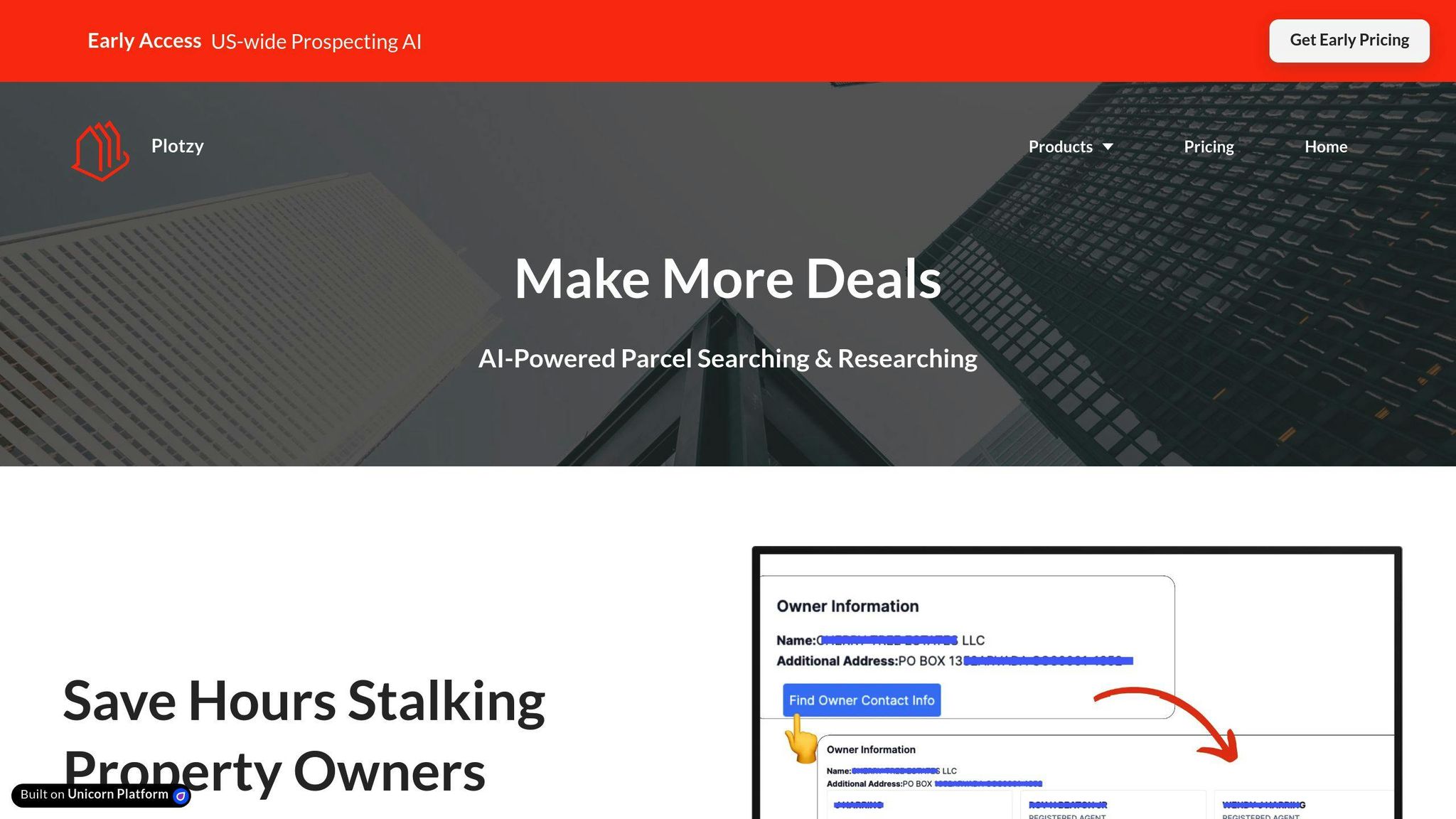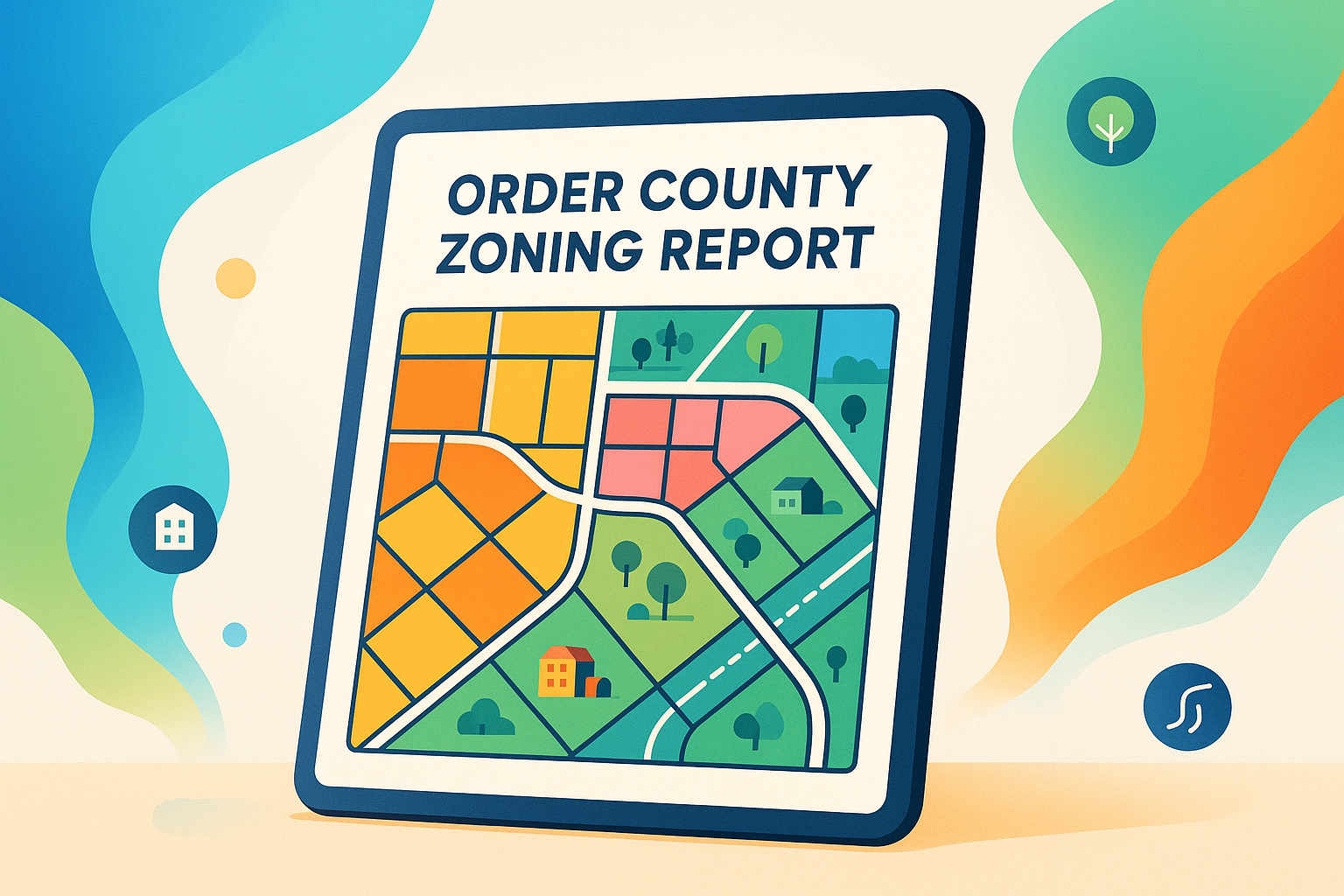AI is revolutionizing real estate with geospatial analysis. Here's what you need to know:
- AI crunches massive location data to help make smarter decisions
- Predicts property values, market trends, and investment opportunities
- Geospatial analytics market expected to hit $141.9 billion by 2028
- Tools like Zillow's Zestimate now within 2% of actual selling price 50% of the time
Key benefits:
- Faster, more accurate property valuations
- Better understanding of climate risks (e.g., ClimateCheck)
- AI-powered buildings can cut energy use by up to 30%
For real estate pros:
- Get on board with AI tools like Plotzy for property research
- Learn to use AI for market analysis and investment decisions
- Keep up with new tech - the landscape is changing fast
Bottom line: AI in real estate isn't about replacing humans. It's about making us better at what we do. The winners? Those who embrace the change and ride the AI wave to success.
Related video from YouTube
Key AI Tools for Location Analysis
AI is changing how real estate pros handle location data. Let's look at the main tools making waves:
Machine Learning for Property Values
Machine learning algorithms are getting good at predicting house prices. They process loads of data - from living area to bedrooms to location - to give accurate estimates.
House Canary is a standout here. Their AI tool uses 40 years of data to forecast prices with less than 3% error. Pretty neat.
For commercial real estate, Skyline AI is popular. They don't just value properties - they predict market trends based on past deals.
AI Image Analysis for Properties
Gone are the days of manually tagging property photos. AI can now scan images and identify what's in them.
A US real estate firm created an AI system that scans satellite images to find vacant land and key features. It's cut decision time for land investments by 90%. The AI can spot things like:
- Empty vs. built-on plots
- Commercial or residential buildings
- Road access
- Vegetation coverage
This tech is a big deal for quickly finding prime locations.
Text Analysis for Location Data
AI isn't just good with numbers and pictures. It's getting smart with words too. These tools can go through lots of text data to find the important bits.
Plotzy is making a name for itself here. Their AI digs through property records and zoning info to give you the scoop on any parcel. Need to know what you can build on a lot? Plotzy can help.
AI Forecasting in Real Estate
Forget crystal balls. AI forecasting is the new thing. These tools process huge datasets to predict market trends.
Enodo is one to watch. They use machine learning to:
- Underwrite multifamily deals
- Find similar properties
- Analyze rent trends
- Crunch expense numbers
The McKinsey Global Institute thinks AI could add $110-180 billion to real estate. That's a lot of cash.
Main Data Sources for Location Analysis
AI-powered geospatial analysis is changing the game in real estate. Let's look at the key data sources driving the industry in 2024.
Satellite and Aerial Photos
Overhead imagery is now a must-have for real estate pros. It gives them a top-down view of properties and their surroundings, helping spot prime locations and assess potential.
PREDIK Data-Driven has developed tech that turns satellite photos into valuable info. Their AI can identify infrastructure, analyze buildings, and even predict good construction sites.
A luxury apartment developer used PREDIK's solution to lower investment risk. The AI analyzed satellite images to find areas with the best development potential. This helped the developer adjust their project and boost their ROI.
Property and Zoning Records
Official records are crucial for market research. But they used to be a pain to sort through. Not anymore.
Plotzy is shaking things up with their AI-powered platform. Users can quickly filter and search parcels based on zoning and other criteria.
Nathan Robinson, Plotzy's Co-Founder & CEO, says their tool offers instant zoning answers and parcel searches by permitted use. For $200 a month, users get unlimited property searches and owner contact info lookups.
Population and Economic Data
Knowing population trends and economic facts is key for smart real estate decisions. The American Community Survey (ACS) is a go-to source for this info.
The ACS provides socioeconomic data for different areas. It creates estimates that show population and housing characteristics. This helps real estate pros spot promising areas and predict future demand.
Risk and Safety Information
Environmental and safety data matter when looking at properties. ClimateCheck is leading the way here. They assess the risk of climate-related damage to over 140 million U.S. properties over the next 30 years.
This kind of info is gold. It's not just for insurance companies - developers and investors use it to make smart, long-term decisions.
Plotzy Property Research Tools

Plotzy deserves another mention. Their AI platform is like a Swiss Army knife for real estate pros. It doesn't just give you data - it makes sense of it.
With Plotzy, you can:
- Get detailed property reports
- Find owner contact info
- Check zoning rules
- Manage property lists
What makes Plotzy special is how it combines different data sources into useful insights. It's not just about having data - it's about making it work for you.
In today's fast-moving real estate world, having the right data can make all the difference. These AI-powered tools are giving real estate pros an edge in 2024. By using them, you're not just keeping up - you're staying ahead of the game.
sbb-itb-11d231f
AI Uses in Real Estate
AI is changing the real estate game. It's giving us powerful tools for market analysis, investment decisions, and property valuation. Let's dive into how AI is shaking things up in 2024.
Market Trend Prediction
AI is getting scary good at predicting market trends. How? By crunching tons of data and spotting patterns humans might miss.
Take Proptrends, for example. Their AI can show you future property values and upcoming market shifts. It's not just guesswork - they're spotting real patterns. Like Florida beach houses jumping 15% in winter, while New York apartments drop 10% in summer.
But that's not all. HouseCanary takes it up a notch. They're predicting home values 3 years out for over 18,000 U.S. markets. We're talking about 100 million properties here. And get this - their predictions are off by just 3.1% on average. That's crazy accurate.
Finding Investment Options
Looking for the next big real estate opportunity? AI's got your back.
Skyline AI is a perfect example. Their system digs through data from over 300 sources. It tracks 10,000 attributes for 400,000 U.S. multifamily properties. That's a lot of number crunching. And it pays off - one investor found a $57 million opportunity they might have missed otherwise.
If commercial real estate is more your thing, check out Reonomy. For $400 a month, their AI-powered app gives you detailed property searches, owner info, and debt details. It's like having a super-smart real estate assistant in your pocket.
Checking Investment Risks
AI isn't just about finding opportunities - it's also great at spotting risks.
LeaseLock is using AI in a pretty clever way. They've created a lease insurance product that replaces security deposits. It's cutting down on the financial risks of tenant damages and defaults.
Then there's RentButter. They're looking at bank transactions and credit behavior to predict how tenants will perform. It's giving landlords a crystal ball to see who might be a risky tenant.
City Growth Patterns
Want to know where a city is headed? AI can help with that too.
In New York City, Localize.city is using AI to predict how neighborhoods will change. They're tracking things like sunlight exposure and noise levels to forecast how areas will evolve. It's like seeing into the future of urban development.
Quick Property Price Checks
Remember when getting a property valuation took forever? Those days are gone.
Zillow's Zestimate is the poster child for this. Their AI looks at past sales, neighborhood trends, and property features to give you a real-time valuation. It's often more accurate than traditional methods.
Jeremy Sicklick, CEO of HouseCanary, puts it well:
"Giving REALTORS® instant access to accurate house value and the 'why behind the value' - like market demand, months-of-supply, macroeconomic data, even rental values - allows REALTORS® to become a trusted source of data unattainable elsewhere."
AI in real estate is just getting started. From predicting trends to spotting risks, it's becoming a must-have tool for anyone in the real estate world. The future of real estate? It's looking pretty smart.
How to Use Location Analysis Well
AI-powered location analysis is shaking up real estate. But you need to use these tools right to get results. Here's how to make location analysis work for you in 2024:
Getting Good Data
Good data is key. Without it, even fancy AI tools won't help much.
Check your data sources. Government databases, trusted real estate agencies, and solid Proptech platforms are your best bet. The American Community Survey (ACS) offers great socioeconomic data to spot promising areas.
Clean your data. Fix errors, remove duplicates, and make sure everything's in the same format. It's not fun, but it's crucial.
"In the Proptech-driven commercial real estate landscape, accurate data is the foundation of informed decision-making."
Keep your data fresh. Real estate changes fast. Last year's hot spot might be cooling off now.
Picking the Right Tools
Choosing the right AI tool can be tough. Look for ones that work well with your current systems. It'll save you headaches later.
Think about what you need. Market predictions? Property valuations? Risk assessment? Different tools shine in different areas.
For commercial real estate, check out Reonomy. For $400 a month, you get detailed property searches, owner info, and debt details. It's like having a super-smart assistant in your pocket.
Following Data Rules
Using location data comes with legal duties. Know the laws around data privacy and usage in your area.
Be careful with personal info. Just because you can find someone's contact details doesn't mean you should use them.
Set clear data rules for your team. Define who can access what data and how to use it. It keeps everyone on the same page and helps avoid legal trouble.
Checking Tool Costs
AI tools can be powerful, but they're not always cheap. Compare the cost of the tool with its benefits before you commit.
Take LeaseLens, an AI lease abstraction service. It charges about $25 per commercial real estate lease abstract export. Is that worth it for you? It depends on how many leases you handle and how much time it saves.
Sometimes, spending more on a tool that fits your needs can save you money in the long run.
Tracking Results
Once you're using your tools, watch how they perform. Are they making your job easier? Helping you make better decisions?
Set up some key performance indicators (KPIs) to track:
- Time saved on research
- Accuracy of property valuations
- Number of successful deals closed
Check these often. If a tool isn't pulling its weight, try something else.
Spencer Burton, a real estate expert, says:
"AI tools are enabling CRE teams to process vast amounts of financial data, automate repetitive tasks, repackage existing content in more palatable formats, and gain valuable insights that can inform strategic decision-making."
What's Next in Real Estate AI
AI is about to shake up the real estate world. Let's take a look at what's coming.
New AI Tools
AI is getting smarter, and real estate pros are in for a treat.
OpenAI's o1-preview and o1-mini models, released in September 2024, can crunch numbers and solve complex problems faster than ever. For real estate, this means quick market analysis and accurate property valuations.
Claude 3.5, also released around that time, understands language nuances. It's a game-changer for real estate marketing, creating property descriptions that grab buyers' attention.
But AI isn't just crunching numbers anymore. It's getting creative - designing buildings, optimizing space, and predicting how people will use properties.
Market Changes
AI is set to flip the real estate market upside down:
- Smarter Investments: AI will help investors spot opportunities before others.
- Pricing Precision: AI will use data from many sources to accurately determine property values.
- Customer-Centric Experiences: AI will predict what buyers want, making personalized property recommendations the norm.
- Energy Efficiency: AI-powered buildings will cut energy use. The U.S. Department of Energy predicts up to 30% savings - good for the planet and the bottom line.
Getting Ready for Changes
The AI train is leaving the station. Here's how to get on board:
Learn to use AI tools. It's not about replacing your job - it's about making you better at it. Don't fear the tech - AI tools can make your life easier. Start small, maybe with a tool like Plotzy for property research.
Keep up with new AI tools and techniques. The landscape is changing fast. Start collecting and organizing your data now. The more data you have, the smarter your AI tools will be.
Long-term Changes
AI is set to change real estate as we know it:
Virtual property tours and negotiations will become common. AI will predict when buildings need fixing before they break. CBRE is already doing this, cutting maintenance costs by 15%.
AI will help plan and manage entire neighborhoods, optimizing traffic and energy use. We'll see AI specialists in real estate firms, bridging the gap between tech and property.
As AI gets more powerful, we'll need to deal with issues like data privacy and algorithmic bias.
The future of real estate is AI-powered, data-driven, and more efficient. It's not about replacing humans - it's about boosting what we can do. The winners? Those who embrace the change and ride the AI wave to success.
Summary
AI-powered geospatial analysis is shaking up real estate in 2024. Here's the scoop:
AI is crunching massive amounts of location data, helping real estate pros make smarter decisions. From figuring out what a property's worth to predicting market trends, AI tools are making things more accurate and efficient.
The geospatial analytics market is on fire. It's expected to hit $141.9 billion by 2028. This growth is pushing real estate tech forward in a big way.
Big names like Zillow and Redfin are leading the pack. Take Zillow's Zestimate tool - it's now within 2% of the actual selling price half the time. That's pretty impressive.
AI is changing real estate in some cool ways:
- It's making property valuations faster and more accurate by looking at things like past sales, neighborhood trends, and property features.
- Tools like ClimateCheck are helping investors understand climate risks for properties.
- AI-powered buildings can slash energy use by up to 30%, according to the U.S. Department of Energy.
And this is just the beginning. In the future, we'll likely see more advanced image recognition, smart contracts, and even AI-designed sustainable cities.
For real estate pros who want to stay ahead of the game, getting on board with AI tools is a must. Platforms like Plotzy are offering AI-powered property research, zoning analysis, and owner contact info, making the whole research process a lot smoother.


